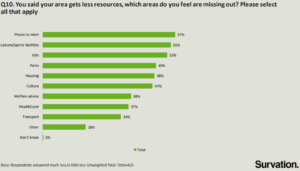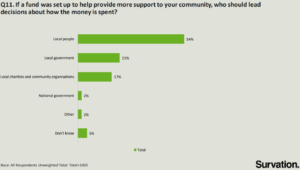A Local Trust/Survation poll in ‘left behind’ areas show that people living in those neighbourhoods feel they are missing out on places to meet and community facilities when compared to other places.
This new polling research commissioned by Local Trust from Survation is based on a representative sample of people living in 225 ‘left behind’ areas in England identified by Local Trust. Dozens of these neighbourhoods fall within the new ‘Red Wall’ political battleground.
Survation asked people in these areas if they feel they are getting their fair share of resources, compared to other nearby communities.
Over four in ten (43%) responded saying they were getting less, with 38% saying it’s ‘about the same’. Just 4% felt they received more.
Of those saying they got less, places to meet was cited most as the biggest area where ‘left behind’ communities were not getting their fair share (57%). This was closely followed by community facilities such as leisure and sports facilities (55%). This highlights the importance that residents in ‘left behind’ communities place on local social infrastructure – places to meet and other community facilities which bring people together. They were both seen as more important than investment in job opportunities and tackling unemployment – the third highest priority at 53%.
Survation’s research also underscores the importance of community power as part of any drive in ‘levelling up’ the most ‘left behind’ areas, with 63% agreeing that when local people do get involved in their community, they really can change the way that their area is run.
When asked if a fund was set up to help provide more support to your community, who should lead decisions about how the money is spent, a clear majority (54%) said local people, with a further 17% saying it should be local charities and community organisations.
This polling analysis supports the case for a Community Wealth Fund, which aims to invest in the structures and processes that support the formation of social and civic assets and social capital in the most ‘left behind’ places, making use of new dormant assets.
It would trust local people with decision making power over resources, enabling them to design and develop services and facilities that best fit their particular needs and aspirations and, over time, to radically improve their neighbourhoods and their quality of life.
This policy proposal is supported by the Community Wealth Fund Alliance (CWFA), which is a group of nearly 260 organisations, including 12 local authorities. It is also backed by a group of 50 cross-party MPs and peers, members of the new APPG for ‘left behind’ neighbourhoods.
The recent report on the future of communities by Danny Kruger MP, a former adviser to the Prime Minister Boris Johnson, calls for a new £2bn ‘Levelling Up Communities Fund’ which closely mirrors the Community Wealth Fund proposal.
Other key findings:
- The lack of places to meet and community facilities in ‘left behind’ areas means fewer opportunities for people to get involved in their neighbourhood, with just 9% having been a member of a community group in the past year.
- Similarly, only 14% have been involved in unpaid voluntary activity in the last year. This is much lower than other areas. According to the government’s latest national Community Life Survey, 37% said they took part in formal volunteering at least once in the last year.
- Despite these areas missing out from investment in the community assets that nurture a thriving community spirit, the polling found one third (33%) of people would personally like to get involved in making those decisions.
- Whilst 64% of respondents indicated they would not like to get more involved in local council decision making, a significant minority disagreed, with nearly three in ten people (28%) saying they would like to have greater input on council matters affecting their area.
- If more money was forthcoming for these ‘left behind’ areas, people felt it should be targeted on projects to tackle mental and physical health issues (79%), projects for young people (76%), and support for small businesses (72%), supporting good job opportunities for residents (70%), and supporting community activities (66%).
Commenting on the poll findings, Matt Leach, CEO of Local Trust, said:
“These findings give an indication as to the key issues that drive many ‘left behind’ communities across England to feel they are not getting their fair share of resources and opportunities.
“They suggest that if the government’s ‘levelling up’ agenda is to succeed, it must balance creating new economic opportunities with investment in improving the social and civic infrastructure of ‘left behind’ neighbourhoods in England.
“This includes supporting investment in new community hubs, recreational and leisure facilities, libraries, and community owned pubs and cafes in areas that cannot sustain free market alternatives. These are vital and foundational community assets, which once in place, allow local people to organise, gain confidence, and contribute to levelling up the neighbourhoods they live in.”


